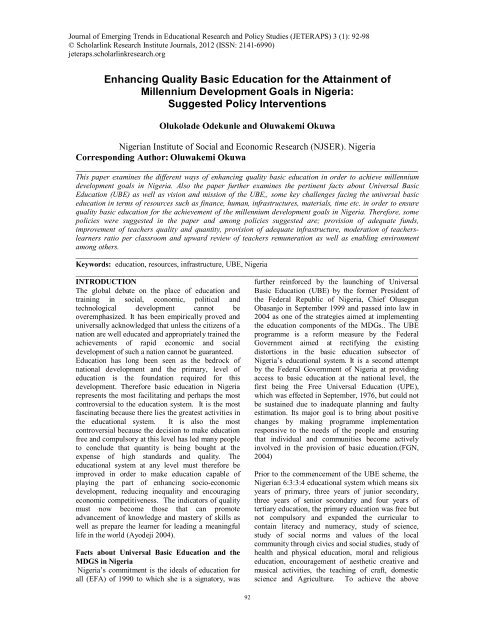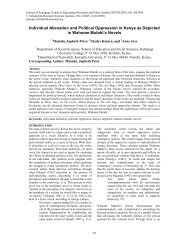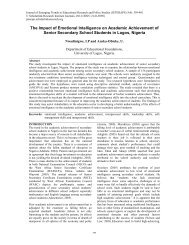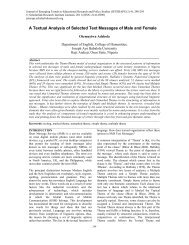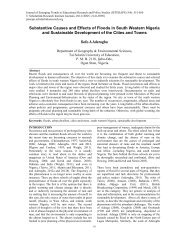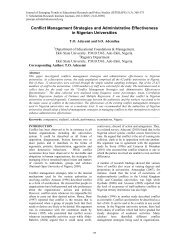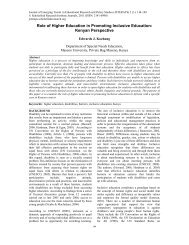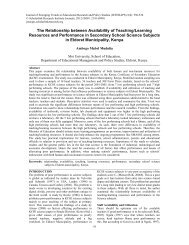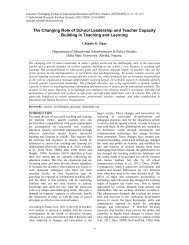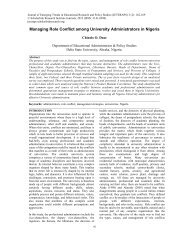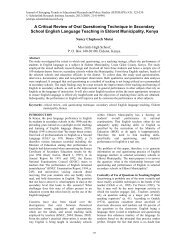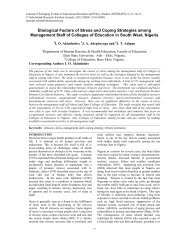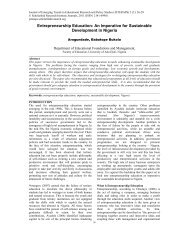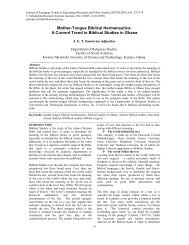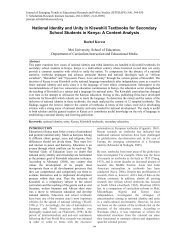Enhancing Quality Basic Education for the Attainment of - Journal of ...
Enhancing Quality Basic Education for the Attainment of - Journal of ...
Enhancing Quality Basic Education for the Attainment of - Journal of ...
Create successful ePaper yourself
Turn your PDF publications into a flip-book with our unique Google optimized e-Paper software.
<strong>Journal</strong> <strong>of</strong> Emerging Trends in <strong>Education</strong>al Research and Policy Studies (JETERAPS) 3 (1): 92-98<strong>Journal</strong> <strong>of</strong> Emerging Trends in <strong>Education</strong>al Research and Policy Studies (JETERAPS) 3(1):92-98 (ISSN:2141-6990)© Scholarlink Research Institute <strong>Journal</strong>s, 2012 (ISSN: 2141-6990)jeteraps.scholarlinkresearch.org<strong>Enhancing</strong> <strong>Quality</strong> <strong>Basic</strong> <strong>Education</strong> <strong>for</strong> <strong>the</strong> <strong>Attainment</strong> <strong>of</strong>Millennium Development Goals in Nigeria:Suggested Policy InterventionsOlukolade Odekunle and Oluwakemi OkuwaNigerian Institute <strong>of</strong> Social and Economic Research (NJSER). NigeriaCorresponding Author: Oluwakemi Okuwa___________________________________________________________________________This paper examines <strong>the</strong> different ways <strong>of</strong> enhancing quality basic education in order to achieve millenniumdevelopment goals in Nigeria. Also <strong>the</strong> paper fur<strong>the</strong>r examines <strong>the</strong> pertinent facts about Universal <strong>Basic</strong><strong>Education</strong> (UBE) as well as vision and mission <strong>of</strong> <strong>the</strong> UBE,, some key challenges facing <strong>the</strong> universal basiceducation in terms <strong>of</strong> resources such as finance, human, infrastructures, materials, time etc. in order to ensurequality basic education <strong>for</strong> <strong>the</strong> achievement <strong>of</strong> <strong>the</strong> millennium development goals in Nigeria. There<strong>for</strong>e, somepolicies were suggested in <strong>the</strong> paper and among policies suggested are; provision <strong>of</strong> adequate funds,improvement <strong>of</strong> teachers quality and quantity, provision <strong>of</strong> adequate infrastructure, moderation <strong>of</strong> teacherslearnersratio per classroom and upward review <strong>of</strong> teachers remuneration as well as enabling environmentamong o<strong>the</strong>rs.__________________________________________________________________________________________Keywords: education, resources, infrastructure, UBE, Nigeria__________________________________________________________________________________________INTRODUCTIONThe global debate on <strong>the</strong> place <strong>of</strong> education andtraining in social, economic, political andtechnological development cannot beoveremphasized. It has been empirically proved anduniversally acknowledged that unless <strong>the</strong> citizens <strong>of</strong> anation are well educated and appropriately trained <strong>the</strong>achievements <strong>of</strong> rapid economic and socialdevelopment <strong>of</strong> such a nation cannot be guaranteed.<strong>Education</strong> has long been seen as <strong>the</strong> bedrock <strong>of</strong>national development and <strong>the</strong> primary, level <strong>of</strong>education is <strong>the</strong> foundation required <strong>for</strong> thisdevelopment. There<strong>for</strong>e basic education in Nigeriarepresents <strong>the</strong> most facilitating and perhaps <strong>the</strong> mostcontroversial to <strong>the</strong> education system. It is <strong>the</strong> mostfascinating because <strong>the</strong>re lies <strong>the</strong> greatest activities in<strong>the</strong> educational system. It is also <strong>the</strong> mostcontroversial because <strong>the</strong> decision to make educationfree and compulsory at this level has led many peopleto conclude that quantity is being bought at <strong>the</strong>expense <strong>of</strong> high standards and quality. Theeducational system at any level must <strong>the</strong>re<strong>for</strong>e beimproved in order to make education capable <strong>of</strong>playing <strong>the</strong> part <strong>of</strong> enhancing socio-economicdevelopment, reducing inequality and encouragingeconomic competitiveness. The indicators <strong>of</strong> qualitymust now become those that can promoteadvancement <strong>of</strong> knowledge and mastery <strong>of</strong> skills aswell as prepare <strong>the</strong> learner <strong>for</strong> leading a meaningfullife in <strong>the</strong> world (Ayodeji 2004).Facts about Universal <strong>Basic</strong> <strong>Education</strong> and <strong>the</strong>MDGS in NigeriaNigeria’s commitment is <strong>the</strong> ideals <strong>of</strong> education <strong>for</strong>all (EFA) <strong>of</strong> 1990 to which she is a signatory, wasfur<strong>the</strong>r rein<strong>for</strong>ced by <strong>the</strong> launching <strong>of</strong> Universal<strong>Basic</strong> <strong>Education</strong> (UBE) by <strong>the</strong> <strong>for</strong>mer President <strong>of</strong><strong>the</strong> Federal Republic <strong>of</strong> Nigeria, Chief OlusegunObasanjo in September 1999 and passed into law in2004 as one <strong>of</strong> <strong>the</strong> strategies aimed at implementing<strong>the</strong> education components <strong>of</strong> <strong>the</strong> MDGs.. The UBEprogramme is a re<strong>for</strong>m measure by <strong>the</strong> FederalGovernment aimed at rectifying <strong>the</strong> existingdistortions in <strong>the</strong> basic education subsector <strong>of</strong>Nigeria’s educational system. It is a second attemptby <strong>the</strong> Federal Government <strong>of</strong> Nigeria at providingaccess to basic education at <strong>the</strong> national level, <strong>the</strong>first being <strong>the</strong> Free Universal <strong>Education</strong> (UPE),which was effected in September, 1976, but could notbe sustained due to inadequate planning and faultyestimation. Its major goal is to bring about positivechanges by making programme implementationresponsive to <strong>the</strong> needs <strong>of</strong> <strong>the</strong> people and ensuringthat individual and communities become activelyinvolved in <strong>the</strong> provision <strong>of</strong> basic education.(FGN,2004)Prior to <strong>the</strong> commencement <strong>of</strong> <strong>the</strong> UBE scheme, <strong>the</strong>Nigerian 6:3:3:4 educational system which means sixyears <strong>of</strong> primary, three years <strong>of</strong> junior secondary,three years <strong>of</strong> senior secondary and four years <strong>of</strong>tertiary education, <strong>the</strong> primary education was free butnot compulsory and expanded <strong>the</strong> curricular tocontain literacy and numeracy, study <strong>of</strong> science,study <strong>of</strong> social norms and values <strong>of</strong> <strong>the</strong> localcommunity through civics and social studies, study <strong>of</strong>health and physical education, moral and religiouseducation, encouragement <strong>of</strong> aes<strong>the</strong>tic creative andmusical activities, <strong>the</strong> teaching <strong>of</strong> craft, domesticscience and Agriculture. To achieve <strong>the</strong> above92
<strong>Journal</strong> <strong>of</strong> Emerging Trends in <strong>Education</strong>al Research and Policy Studies (JETERAPS) 3(1):92-98 (ISSN:2141-6990)countries by 2015. The development goals, whichhave been embraced by <strong>the</strong> World Bank, have notprovided a focus <strong>for</strong> <strong>the</strong> Bank’s developmentprogrammes. The goals which are put in place toaddress specific poverty indices include <strong>the</strong>following:1. Eradicate extreme poverty and Hunger.2. Achieve universal primary education.3. Promote gender equality and empowerment<strong>of</strong> women.4. Reduce child mortality.5. Improve maternal health.6. Combat HIV/AIDS, malaria and o<strong>the</strong>rcommunicable diseases.7. Ensure Environmental sustainability.8. Develop a Global Partnership <strong>for</strong>development.The attainment <strong>of</strong> <strong>the</strong>se goals has been a challenge todeveloping nations <strong>of</strong> <strong>the</strong> world. While overallsignificant progress has been recorded worldwide, <strong>the</strong>progress however has not been uni<strong>for</strong>m across <strong>the</strong>world with respect to some specific goals. Thefederal government <strong>of</strong> Nigeria faces <strong>the</strong> challenge <strong>of</strong>meeting <strong>the</strong> MDGs and believes that <strong>the</strong> attainment<strong>of</strong> <strong>the</strong> goals will be at stake if human and materialresources <strong>of</strong> <strong>the</strong> country remain untapped. One <strong>of</strong> <strong>the</strong>strategies adopted by <strong>the</strong> country in her multiprongedapproach towards attaining <strong>the</strong>se goals is <strong>the</strong>empowerment <strong>of</strong> people through education. Earlyinvestment in <strong>the</strong> basic education is also endorsed by<strong>the</strong> United Nations Development Programme(UNDP) <strong>for</strong> its capacity to foster gender equality andsustained economic growth. National government anddonor organisations have concentrated investment onincreasing school participation at <strong>the</strong> primary level in<strong>the</strong> developing countries. Most <strong>of</strong> <strong>the</strong> poorestcountries, including most Sub-Saharan African (SSA)countries are increasing <strong>the</strong>ir ef<strong>for</strong>ts (resources) toimprove access to and quality <strong>of</strong> primary education.This creates an increasing demand by parents andcommunities to let <strong>the</strong>ir children benefit from <strong>the</strong>next stage in <strong>the</strong> education circle, largely ignoring <strong>the</strong>need to simultaneously increase quality and capacityat <strong>the</strong> secondary level.Bregman and Brymen (2005) found out in <strong>the</strong>ir workon quality <strong>of</strong> primary education in Africa, that mostSub Saharan African countries are at different stages<strong>of</strong> re<strong>for</strong>ming <strong>the</strong>ir education system. Many havebegun to address access issues, re<strong>for</strong>m <strong>the</strong> curriculumor develop management capacity. They were <strong>of</strong> <strong>the</strong>opinion that as government moves towardsestablishing an egalitarian ra<strong>the</strong>r than elitist educationsystem; <strong>the</strong>y need to ask <strong>the</strong>mselves and stakeholders<strong>of</strong> education ‘what is <strong>the</strong> purpose and intent <strong>of</strong>primary education system in general and juniorsecondary school specifically? Pitchard (2002a)introduced <strong>the</strong> idea <strong>of</strong> using lesson quality adjustmentin <strong>the</strong> measurement <strong>of</strong> education output. According tohim, government inspector in U.K make assessmentregarding <strong>the</strong> quality <strong>of</strong> lessons, Powell and Pitchard(2002) noted that weight could be assigned to <strong>the</strong>three rating categories <strong>for</strong> lessons such as good, verygood lessons, satisfactory lessons and unsatisfactorylessons, <strong>the</strong>y concluded that if <strong>the</strong>se assessmentswere used to <strong>for</strong>m a lesson quality adjustment, <strong>the</strong>rate <strong>of</strong> growth <strong>of</strong> volume <strong>of</strong> indicators would beraised. The children <strong>of</strong> any nation are its greatestresource. In <strong>the</strong> future, <strong>the</strong> prosperity and quality <strong>of</strong>life <strong>of</strong> all nations will be determined by today’schildren and <strong>the</strong>ir ability to solve problems that face<strong>the</strong>m, <strong>the</strong>ir communities and <strong>the</strong>ir countries.<strong>Education</strong> unlocks this ability and investment inchildren’s learning is <strong>the</strong> most important contributionany nation can make to better <strong>the</strong> future <strong>of</strong> hercitizens.Thias and Carnoy (1972) carried out research workon <strong>the</strong> influence <strong>of</strong> school factors on <strong>the</strong> quality <strong>of</strong>school, output in Kenya. Their results show thatquality <strong>of</strong> output is equated with student examinationper<strong>for</strong>mance. Thus in measuring education outputper<strong>for</strong>mances <strong>of</strong> students are always considered. Thisis measured in terms <strong>of</strong> <strong>the</strong> grades obtained by <strong>the</strong>students in a course or group <strong>of</strong> courses (Kemmis,1994, Adeyemo 1998 and Akangbou 1985).Rahman et al (2005) assessed <strong>the</strong> effectiveness <strong>of</strong>community intervention in improving <strong>the</strong> quality <strong>of</strong>basic education. They found out that child friendlycommunity learning programme (SOPAN) schooleliminate some <strong>of</strong> <strong>the</strong> constraints and students’per<strong>for</strong>mance <strong>for</strong> both boys and girls has improvedboth in aggregate and individual subject scorescompared to that <strong>of</strong> control schools where no suchintervention exists.Teacher as <strong>the</strong> Key <strong>Quality</strong> Factor in <strong>Education</strong>Teachers’ knowledge, an intended outcome <strong>of</strong> preservicetraining, is strongly and consistently related tostudent per<strong>for</strong>mance (World Bank, 1995). As aresult, teachers are <strong>the</strong> main medium through whichstudents learn, especially during <strong>the</strong> foundation years,making school <strong>the</strong> important functional locus <strong>of</strong>ef<strong>for</strong>ts <strong>for</strong> improving quality requires <strong>the</strong>re<strong>for</strong>e thatteachers use <strong>the</strong>ir pr<strong>of</strong>essional attitudes, energy, andmotivation in combination with teaching skills increating quality learning. Teacher quality is,<strong>the</strong>re<strong>for</strong>e, <strong>the</strong> most important school – related factorinfluencing student achievement (Schon, 1983 andRice, 2003)While acknowledging this fact, <strong>the</strong> UNESCO<strong>Education</strong> <strong>for</strong> All (EFA) Global Monitoring Reportnoted:“What goes on in <strong>the</strong> classroom, and <strong>the</strong> input<strong>of</strong> <strong>the</strong> teacher and teaching, has beenidentified in numerous studies as <strong>the</strong> crucialvariable <strong>for</strong> improving learning outcomes.The way teachers teach is <strong>of</strong> critical concern94
<strong>Journal</strong> <strong>of</strong> Emerging Trends in <strong>Education</strong>al Research and Policy Studies (JETERAPS) 3(1):92-98 (ISSN:2141-6990)in any re<strong>for</strong>m designed to improve quality(UNESCO, 2004: 152).”In defining educational achievements, mostgovernments emphasize on years in school and not onknowledge and skills (World Bank, 1995). They failto recognize that school attendance is only a means <strong>of</strong>acquiring skills and knowledge but it is not an end initself. The numbers <strong>of</strong> pupils attending school <strong>for</strong>how many years is not as important as what <strong>the</strong>ylearn. What goes on in <strong>the</strong> classroom depends on anumber <strong>of</strong> factors including teacher training andpreparedness, which are not in return influenced by<strong>the</strong> school environment among many o<strong>the</strong>r factors(Riding, et al, 1995). The UNESCO reportenumerates five areas critical to teacher quality:finding <strong>the</strong> right recruits; initial teacher education; ongoing pr<strong>of</strong>essional support; teacher earnings; andteacher deployment and conditions <strong>of</strong> service.Considering that teachers’ salaries constitute <strong>the</strong>largest public expenditure in budgets <strong>of</strong> lessdeveloped countries, <strong>the</strong> central dilemma facingmany governments is paying <strong>the</strong>m, expanding <strong>the</strong>teaching <strong>for</strong>ce to fulfill <strong>the</strong> demands <strong>of</strong> increasingenrolments, and devoting resources to improving <strong>the</strong>quality <strong>of</strong> teachers (UNESCO, 2004: 161). As with<strong>the</strong> provision <strong>of</strong> education, many countries need toaddress issues <strong>of</strong> teacher quality simultaneously.Innovative ways <strong>of</strong> meeting both demands areurgently being sought; ideas include shorter preserviceteacher education, recruitment <strong>of</strong> teacherswith higher education qualifications intensified inservicepr<strong>of</strong>essional development, and increasedschool-based support (Verspoor, 2004: 6).Generally held perspectives on good teacher qualitiesinclude: sufficient knowledge <strong>of</strong> subject matter toteach with confidence; knowledge and skills in arange <strong>of</strong> appropriate and varied teachingmethodologies; knowledge <strong>of</strong> <strong>the</strong> language <strong>of</strong>instruction; knowledge <strong>of</strong>, sensitivity to, and interestin young learner; ability to reflect on teachingpractice and children’s responses; ability to modifyteaching/learning approaches as a result <strong>of</strong> reflection;ability to create and sustain an effective learningenvironment; understanding <strong>of</strong> <strong>the</strong> curriculum and itspurposes, particularly when re<strong>for</strong>m programmes andnew paradigms <strong>of</strong> teaching and learning areintroduced; general pr<strong>of</strong>essionalism, good moral anddedication to <strong>the</strong> goals <strong>of</strong> teaching; ability tocommunicate effectively; ability to communicateenthusiasm <strong>for</strong> learning to students; interest instudents as individuals, a sense <strong>of</strong> caring, compassionand responsibility to help <strong>the</strong>m learn and becomeresponsible people, good character, ethical, andpersonal discipline; and ability to work with o<strong>the</strong>rsand to build good relationships within <strong>the</strong> school andcommunity (Chesterfield and Rubio, 1997; Craig etal, 1998; Fensterma<strong>the</strong>r and Richardson, 2000;Fredriksson, 2004; Heneveld and Craig, 1996; leu,2004b; UNESCO, 2004) and Boyle, et al (2003)Equipped with <strong>the</strong>se qualities, a good teacher issupposed to be passionate and committed to doing <strong>the</strong>best <strong>for</strong> <strong>the</strong>ir students, love children in warm andcaring relationship and know how to identify,present, and explain key concepts. A well-trainedteacher will make use <strong>of</strong> variety <strong>of</strong> teaching andlearning models encourage a collaborative workingstyle with o<strong>the</strong>r teachers to plan, observe, and discusseach o<strong>the</strong>r’s work. With experience, effectiveteachers shall be involved in constant questioning <strong>of</strong>,reflecting on, and modifying <strong>the</strong>ir own practice(Hopkins and Stern, 1996, quoted in Nuthal, 2004:282). However, where teachers are not adequatelytrained and qualified, <strong>the</strong>se expectations will be farfetched.To be effective in <strong>the</strong>ir work, teachers shouldbe well trained, given an enabling environment <strong>for</strong>operationalising <strong>the</strong>ir skills in addition to asupportive policy framework <strong>for</strong> pr<strong>of</strong>essional growth(Van der Berghe, (1995). There should be amechanism <strong>of</strong> encouraging undertaking continuousresearch <strong>of</strong> <strong>the</strong> teaching-learning process andcarefully monitoring <strong>the</strong> relationship between <strong>the</strong>irexpected roles and student learning. To do this, <strong>the</strong>yhave to conduct, independent, in-depth assessment <strong>of</strong>what students learn; collect data on individual studentexperience and classroom activities; and makeanalyses based on <strong>the</strong> continuous connectionsbetween classroom activities, students experience andlearning processes (Nuthall, 2004; 296 – 297).Teachers in Nigeria lack appropriate training inresearch and are overwhelmed by increasingenrolments to be able to collect students’ data toenable <strong>the</strong>m properly monitor <strong>the</strong>ir progress. Inaddition, pr<strong>of</strong>essional growth is rare.Suggested Policy InterventionsA number <strong>of</strong> national committees and commissionshave influenced <strong>the</strong> development <strong>of</strong> policies inNigeria’s education system, which has not yielded <strong>the</strong>required qualitative expansion. It is significant tonote that although policy documents reflect onawareness <strong>of</strong> <strong>the</strong> critical importance <strong>of</strong> quality andpositive learning out-comers, very <strong>of</strong>ten, <strong>the</strong>references have focused on deficits in quality andvery uncertain outcomes (King, 2006). Owing t<strong>of</strong>inancial and o<strong>the</strong>r factors, challenges <strong>of</strong> access,equity, poor implementation <strong>of</strong> policies, poorbudgetary allocation to education, manpowershortages, quality and relevance among o<strong>the</strong>rs havecharacterised Nigeria’s educational system.( Boud,.etal, 1985)The reports <strong>of</strong> <strong>the</strong> National Committees on<strong>Education</strong>al Objectives and Policies focused mainlyon redefining <strong>the</strong> country’s educational policies andobjectives, giving consideration to national unity,economic, social and cultural aspirations <strong>of</strong> <strong>the</strong>95
<strong>Journal</strong> <strong>of</strong> Emerging Trends in <strong>Education</strong>al Research and Policy Studies (JETERAPS) 3(1):92-98 (ISSN:2141-6990)people <strong>of</strong> <strong>the</strong> Federal Republic <strong>of</strong> Nigeria (FederalRepublic <strong>of</strong> Nigeria 1972). It recommendedUniversal Primary <strong>Education</strong> (UPE) in September1976 throughout <strong>the</strong> whole Federation. Under thisscheme, duration in primary education throughout <strong>the</strong>whole Federation became uni<strong>for</strong>m and stood at sixyears in order to teach civic, moral and practicalskills that would physically mature <strong>the</strong> children. Thisis also aimed at reducing <strong>the</strong> level <strong>of</strong> illiteracy inNigeria as well as attaining <strong>the</strong> target <strong>of</strong> <strong>the</strong>Millennium Development goals (MDGS) by <strong>the</strong> year2015.To ensure quality basic education in order to achievemillennium development goals in Nigeria, <strong>the</strong>re<strong>for</strong>e<strong>the</strong> following among o<strong>the</strong>r policies should be put inplace.‣ Provision <strong>of</strong> Adequate Funds: The fundsmade available to schools in relatively smallcompared to <strong>the</strong> increase in demand <strong>for</strong>education. Government should realize thateducation is an investment in development but<strong>the</strong>n, a capital-intensive venture <strong>of</strong> highpriority. As such, increasing financialprovisions must be made available to <strong>the</strong> basicschools by <strong>the</strong> government at all levels.‣ Improvement <strong>of</strong> Teachers <strong>Quality</strong> andQuantity: The popular saying that “noeducational system can rise above <strong>the</strong> quality<strong>of</strong> teachers in <strong>the</strong> system” is ra<strong>the</strong>r apt at thismoment in <strong>the</strong> Nigerian education system. Itis obvious that <strong>the</strong> attainment <strong>of</strong> universalprimary education component <strong>of</strong> <strong>the</strong> MDGsdepends largely on <strong>the</strong> availability <strong>of</strong> teachersin sufficient numbers and quality to per<strong>for</strong>m<strong>the</strong> task. For UBE to have intended impact on<strong>the</strong> learners, <strong>the</strong>ir learners must be capable <strong>of</strong>imparting permanent literacy and numeracyand some useful communication skills to <strong>the</strong>m.The government is <strong>the</strong>re<strong>for</strong>e enjoined toprovide adequate and qualitative staffing <strong>of</strong>schools.‣ Provision <strong>of</strong> Adequate InfrastructuralMaterials: For basic education system toachieve its set goals, <strong>the</strong> need to put certaineducational materials, equipment and facilitiesin place cannot be over-emphasized.Un<strong>for</strong>tunate, <strong>the</strong>se facilities are in short supplyat all levels <strong>of</strong> education. In some, cases, <strong>the</strong>yare non-existence and where <strong>the</strong>y are availableat all, <strong>the</strong>y are in deplorable condition. Toenhance proper teaching-learning process inour basic schools facilities such as library andlaboratory must be well-equipped anddilapidated buildings must be reconstructed.Also, teaching aids must be made available toteachers to facilitate learning. The schoolenvironment should be made conducive andattractive <strong>for</strong> proper administration.Moderation <strong>of</strong> Teacher-Learners Ratio perClassroom: Due to <strong>the</strong> ever-increasing quest <strong>for</strong>education and its attendant increase in students’population, <strong>the</strong> number <strong>of</strong> pupils accrued to a teacherper class has unmanageably increased in mot publicschools in Nigeria. In fact, <strong>the</strong>re are cases <strong>of</strong> over100 pupils heaped up in a small classroom only to betaught and controlled by just a teacher. This menacecan be traced back to non-availability <strong>of</strong> enoughclassrooms and inadequate staffing <strong>of</strong> schools. Thegovernment is <strong>the</strong>re<strong>for</strong>e enjoined to moderateteacher-learners ratio to <strong>the</strong> normal 1:30 respectivelyby providing enough classroom accommodation andemploying more effective teaching <strong>for</strong>ce in order toenhance effective learning in our basic schools.(Ani,(1999)‣ Improvement <strong>of</strong> <strong>the</strong> <strong>Basic</strong> <strong>Education</strong> Curricula:Prior to civilization, traditional educationemphasized <strong>the</strong> skills acquisition and selfreliantattitudes that made its products useful to<strong>the</strong>mselves and <strong>the</strong> society. However, westerneducation in Nigeria has <strong>of</strong>ten been criticized aselitist and non-functional as majority <strong>of</strong> itsproduct have no marketable skills that would fit<strong>the</strong>m into a world <strong>of</strong> employment. Themismatch between education and employmentplanning, in which education is fast expandingand complementary employment opportunitiesare not being created has led to <strong>the</strong> production<strong>of</strong> all-equipped graduates, majority <strong>of</strong> whom areroaming <strong>the</strong> street in search <strong>of</strong> jobs. There is<strong>the</strong>re<strong>for</strong>e <strong>the</strong> dire need <strong>for</strong> government,academia, planners as well as society tocritically re-examine <strong>the</strong> basic educationcurricula with a view <strong>of</strong> making it morefunctional, skills acquisitive, self-reliant innature and politically-directed to <strong>the</strong> end thatproducts from this educational level would beable to stand on <strong>the</strong>ir own after graduationespecially <strong>for</strong> those that did not intend to fur<strong>the</strong>r<strong>the</strong>ir education beyond this level.‣ Upward Review <strong>of</strong> Teachers’ Remuneration:For effective discharge <strong>of</strong> duties, teachersshould not be treated as <strong>the</strong> underdogs <strong>of</strong> <strong>the</strong>economy and <strong>the</strong> socio-political system. Theirpay-package should be reviewed and incentivesshould be given to <strong>the</strong>m as it is being given to<strong>the</strong>ir counterparts in <strong>the</strong> industries. If this isdone, it will no small way enhance quality basiceducationThere is dire need <strong>for</strong> government and stakeholders tosee basic education as a fundamental tool to attainingnational development. There<strong>for</strong>e more funds shouldbe directed towards this level <strong>of</strong> education in order to96
<strong>Journal</strong> <strong>of</strong> Emerging Trends in <strong>Education</strong>al Research and Policy Studies (JETERAPS) 3(1):92-98 (ISSN:2141-6990)enhance its quality. If we can achieve quality basiceducation in Nigeria, <strong>the</strong>n attaining <strong>the</strong> MillenniumDevelopment Goals is not far-fetched.- <strong>Quality</strong> <strong>of</strong> education can be improvedthrough developing national standards to beachieved, en<strong>for</strong>cing and monitoring <strong>the</strong>same to ensure effective instruction inschool.- Creation <strong>of</strong> opportunities <strong>for</strong> focused andsustained staff development will enhancestudent learning.- <strong>Quality</strong> <strong>of</strong> education will improve wheregovernment and stakeholders focus onactivities that will improve student learningand per<strong>for</strong>mance to address local needs andcircumstances- Sensitization <strong>of</strong> all stakeholders about <strong>the</strong>implementation <strong>of</strong> <strong>the</strong> courses andencouraging visits to schools, sharing <strong>the</strong>progress made with teachers and studentsand giving <strong>the</strong>m <strong>the</strong> support that is required.Enabling <strong>Education</strong> Inputs- A strong and effective training programme andenhanced teacher’s working conditions requirespecial considerations to attain an education <strong>of</strong>quality.- Retraining <strong>of</strong> teachers is essential to enable<strong>the</strong>m to acquire new technologies <strong>for</strong> enhancing<strong>the</strong> teaching and learning processes.- Attractive classroom environment attracts a lot<strong>of</strong> students and attendance and improvesschools effectiveness. Students find a richreadingenvironment attractive and as such willfind something meaningful to do at school thatwill not get <strong>the</strong>m bored.- Training only <strong>the</strong> numbers <strong>of</strong> teachers require inschools is an efficient way <strong>of</strong> using scarceresources.- Systematic and continuous learning assessmentschemes are needed in all educational systemsin order to understand <strong>the</strong> dynamics <strong>of</strong> teachingand learning context.CONCLUSIONNigeria UPE and UBE Programmes have enhancedaccess to basic education. However, owing t<strong>of</strong>inancial constraints and poor budgetary allocationsand implementation, <strong>the</strong> programme has facednumber <strong>of</strong> challenges, which must be redressed so asto make it a worthwhile investment.According to Oni, (1999) and Akinwumi (2007), it isevident that <strong>the</strong> quality <strong>of</strong> <strong>the</strong> country’s Primary<strong>Education</strong> is threatened. Although <strong>the</strong> policydocuments indicate government commitment toproviding quality education, <strong>the</strong> country appears to belagging behind in achieving <strong>the</strong> prospected quality <strong>of</strong>education. Gaps exist in terms <strong>of</strong> <strong>the</strong> quality <strong>of</strong>teacher training programmes, assessment procedures,setting <strong>of</strong> standards, monitoring per<strong>for</strong>mance,creating a favourable and enabling environment <strong>for</strong>primary education to ensure that all <strong>the</strong> studentsreceive quality and education.It is obvious that <strong>the</strong>re is more focus on access andnot on outcomes with serious implications on <strong>the</strong>country’s development goals.REFERENCESAni, C. I. (1999) Dimensions <strong>of</strong> Systems <strong>of</strong><strong>Education</strong> in Nigeria. Enugu J. TC Publishers.Adeyemo, T, O (1998) Labour Movements andPolicy-Making in Africa CODESRIA, WorkingPaper.Akangbou 1985) ‘’<strong>Education</strong>al Planning and Policyin Nigeria.’’ Published by <strong>the</strong> University Press,Ibadan, NigeriaAkinwumi, J. F (2007) The Demand <strong>for</strong> UniversityGraduates and Employers’ Assessment <strong>of</strong> GraduatesSkills in Nigeria” Draft, Ibadan, NISER.Ayodeji, G.S. (2004) <strong>Education</strong> and Development: APaper Presented at a Training Workshop organised byManpower Development Department, NISER,Ibadan.Boud, D.et al (1985) Reflection: Turning Experienceinto learning. LondonBoyle, B et al (2003) A longitudinal study <strong>of</strong> Teacherchange: What makes Pr<strong>of</strong>essional Developmenteffective? Manchester.Chester Field, R. and Rubio, F. E. (1997). ImpactStudy <strong>of</strong> <strong>the</strong> Best Teacher Effectiveness inGuatemala Higher <strong>Education</strong>. Washington, D.C.Craig et al, (1998) Teacher Development: Making animpact. Washington, D.CFederal Republic <strong>of</strong> Nigeria (2004) National policyon <strong>Education</strong>FenSterMacher, G. D, and Richardson (2000). Onmaking Determinants <strong>of</strong> <strong>Quality</strong> in Teaching,National Research Council, Washington, D.C.97
<strong>Journal</strong> <strong>of</strong> Emerging Trends in <strong>Education</strong>al Research and Policy Studies (JETERAPS) 3(1):92-98 (ISSN:2141-6990)Harvey, I. (1995), Editorial <strong>Quality</strong> in Higher<strong>Education</strong>.Hopkins, D. and Stern, F (1996). A Teacher’s guideto Classroom Research. Philadephi: Open UniversityPress.Kemmis, S. (1994). Action Research; In <strong>the</strong>International Encyclopaedia <strong>of</strong> <strong>Education</strong> New York.King, K. (2006) Post-<strong>Basic</strong> <strong>Education</strong> Training <strong>for</strong>Growth and Poverty Reduction: Towards a History <strong>of</strong>Policy in Kenya 1963-2005Nuthall, G. (2004). Realizing Classroom Teaching toStudent Learning: Harvard <strong>Education</strong>al Review 74(3).Oni, B. (1999). The Nigerian University Today and<strong>the</strong> Challenges <strong>of</strong> Twenty-First Century: Ibadan.Rahman et al (2005) Cost and Financing <strong>of</strong>University <strong>Education</strong> in Africa: The NigerianExperience.Riding, P , (1995). An Action Research Approach toCurriculum Development: In<strong>for</strong>mation Research.Schon, D. (1983). The Reflective Practitioner: HowPr<strong>of</strong>essionals Think in Action. New York: <strong>Basic</strong>Books.UNESCO (2004). EFA Global Monitoring Report2005: <strong>Education</strong> For All: The <strong>Quality</strong> Imperative.Paris.Van der Berghe, W. (1995) Achieving <strong>Quality</strong> inTraining: European Guide <strong>for</strong> Collaborative TrainingProjects.World Bank (1995). Priorities and Strategies <strong>for</strong><strong>Education</strong>: A World Bank Review. Washington, D.C98


